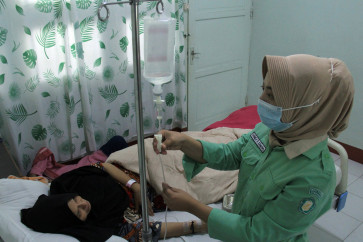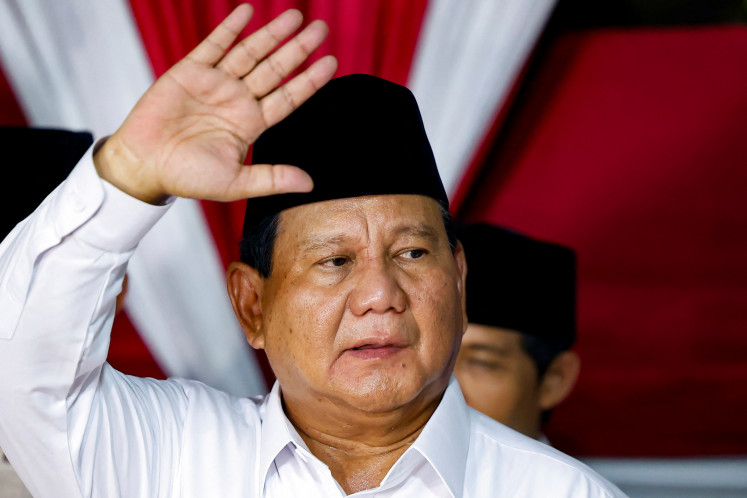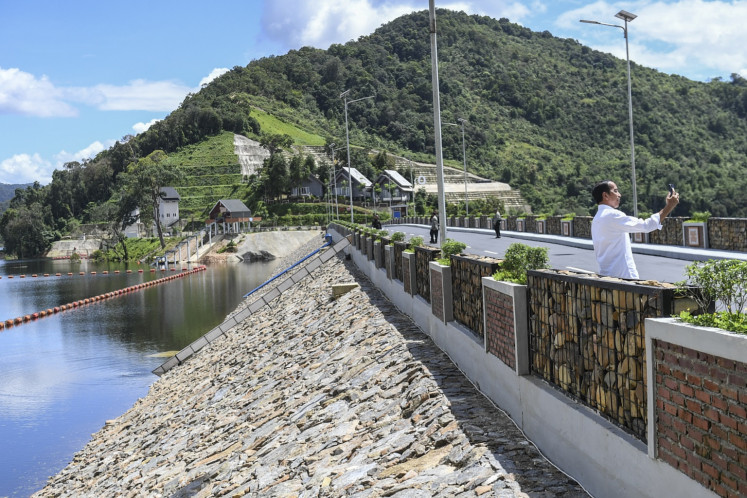Slow global recovery hits Indonesian exports
Indonesia recorded month-on-month (mom) export growth in June and July after contractions in April and May, during which Indonesia implemented strict movement restrictions.
Change Size

I
ndonesia failed to continue an upward trend in monthly exports in August as slow global economic recovery reduced demand for the country’s products.
Southeast Asia’s largest economy recorded US$13.07 billion in exports in August, down 4.62 percent compared to July and down 8.34 percent annually, as the pandemic upended global demand, Statistics Indonesia (BPS) announced on Tuesday. The country recorded month-on-month (mom) export growth in June and July after contractions in April and May, during which Indonesia implemented strict movement restrictions.
Exports of oil and gas products fell 27.4 percent year-on-year (yoy) to around $610 million in August, while exports of mining products decreased 24.7 percent yoy to $1.39 billion due to falling commodity prices.
At the same time, shipments of agriculture products rose 1.04 percent yoy to $340 million as manufactured goods exports dropped 4.5 percent to $10.37 billion in August.
“Indonesia’s total exports dropped due to slowing global economic activity, while demand from our trading partners was still weak compared to previous years,” BPS head Suhariyanto told reporters in an online press briefing on Tuesday.
The health crisis has hit the world’s economy, with the International Monetary Fund (IMF) projecting the global economy to shrink 4.9 percent this year from growth of around 3 percent in 2019. The COVID-19 pandemic has forced some countries to implement lockdown measures that disrupt business activity and supply chains in an effort to curb the coronavirus spread, resulting in economic recession in countries from Singapore and Japan to Germany and the United States.
IMF chief Kristalina Georgieva said in a column co-authored with chief economist Gita Gopinath on Sept. 9 that the global economy was showing signs of bouncing back from the severe downturn caused by the pandemic, but a full recovery was "unlikely" without a vaccine.
The World Trade Organization (WTO) projects global trade volumes will contract by between 13 percent at best and 32 percent at worst this year.
"The heavy economic toll of the COVID-19 pandemic suggests that the projections for a strong, V-shaped trade rebound in 2021 may prove overly optimistic," the WTO wrote in its Goods Trade Barometer report published last month.
"As uncertainty remains elevated, in terms of economic and trade policy as well as how the medical crisis will evolve, an L-shaped recovery is a real prospect."
Indonesia’s total exports during January to August stood at $103.16 billion, a 6.51 percent drop compared to the same period last year, BPS data show, with China, the US and Japan the top three export destinations.
The country booked a $2.33 billion trade surplus in August, lower than the nine-year high of $3.26 billion recorded in July, as exports fell in the month while contraction in imports slowed, pointing to a bumpy economic recovery ahead amid the coronavirus pandemic. As of August, Indonesia recorded a trade surplus of $11.05 billion versus a $2.06 billion deficit in the same period last year.
Imports, meanwhile, stood at $10.74 billion in August, down 24.19 percent yoy despite a jump of 2.65 percent mom, as domestic demand for consumption and raw materials rose slightly compared to the previous month but was still weak compared to last year.
Imports of consumer goods and raw materials rose in August to $1.19 billion, driven by higher imports of grapes from China, raw sugar from India and gold from Hong Kong, among other things.
Shipments of bullion and jewelry recorded the steepest decline in August mainly due to falling prices after recording an all-time high price in July, followed by exports of mineral fuels and vegetable oils.
“Going forward, we see import growth will remain weaker than exports due to a halt in domestic investment and production activities amid the ongoing COVID-19 pandemic,” Bank Mandiri economist Andry Asmoro wrote in a note.
Jakarta's decision to reinstate large-scale social restrictions (PSBB) is expected to hamper Indonesia's economic recovery and depress imports further, he went on to say, but exports may continue to rise following a global economic recovery led by the US and China, Indonesia's major export destinations.
Indonesia’s economy shrank 5.32 percent in the second half this year and is widely expected to fall further in the third quarter, which would mark the first recession since the 1998 Asian financial crisis.
Mirae Asset Sekuritas Indonesia economist Anthony Kevin said the recent trade data suggested that net exports would be a positive contributor to gross domestic product (GDP) in the third quarter this year.
“We are seeing a pickup in global economic recovery in line with vaccine development, this will be positive for the contribution of exports to GDP,” he told The Jakarta Post on Tuesday. “But falling imports showed signs of continued weakening of purchasing power.”
He expected household spending, Indonesia’s largest GDP contributor, to shrink at least 2 percent in the third quarter this year. “Slow fiscal stimulus disbursement, rupiah exchange rate depreciation and a rise in virus cases will all bring down domestic consumption.”









